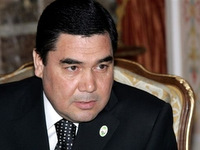
Are Turkmenistan’s energy reserve figures fudged or not? Just over a week after allegations first surfaced that the Turkmen government’s claims are grossly hyped, the controversy over Ashgabat’s export capacity is still flaring. Representatives of the firm that conducted the original audit are vigorously defending their reputation for thoroughness. Meanwhile, a whistleblower says he remains confident in the accuracy of his sources’ information.
The results of an audit performed by the British energy consultancy firm Gaffney Cline & Associates, released just over a year ago, concluded that the South Yolotan-Osman natural gas field contains between 4 trillion and 14 trillion cubic meters (TCM) of gas. The most likely total is around 6/tcm. Such volumes would make the field one of the world’s largest and enable Turkmenistan to increase its annual production capacity by 70 billion cubic meters per year, roughly double the current level.
On October 12, two separate sources -- Russian journalist Arkady Dubnov, writing for the Russian newspaper Vremya Novostei, and a Germany-based non-governmental organization called the Eurasian Transition Group (ETG) -- alleged that the Turkmen government misled the independent auditors by providing them with inaccurate, hyped data. The end result was that Turkmenistan’s actual reserves are probably far lower than the estimate contained in the 2008 Gaffney Cline report.
In an email exchange conducted with a EurasiaNet correspondent, Jim Gillet, a top Gaffney Cline representative, explained that the thoroughness of an audit depends on the quality of the data provided. He steadfastly defended Gaffney Cline’s reputation for auditing expertise, insisting that the comprehensive nature of its auditing methods would make fraud very difficult to perpetrate.
"There is a very considerable volume of data to be assessed on a project of this nature. This data [comes] in a wide range of types and from a range of sources," Gillet explained. "Therefore, in practical terms, it would be impossible to falsify it all [in a way] such that it could still appear to be coherent and could mislead an expert team. This is why companies like [Gaffney Cline] are used by organizations, such as stock exchanges and banks, to provide independent and expert opinion on such issues."
Meanwhile, Dubnov, when reached by a EurasiaNet correspondent, vigorously defended the integrity of his sources. He stressed that it was the impression of his sources that Gaffney Cline was not involved in hyping the reserve figure. The British firm, Dubnov emphasized, "submitted results that are based on [misleading] data submitted by the Turkmen side."
 The origin of the energy-reserves controversy can be traced back to a point when several Western energy companies purchased official Turkmen government technical data in order to complete tenders to develop gas deposits. "Some experts from Western companies could not believe the data they were provided by Turkmen officials," according to ETG. The controversy burgeoned until it came to the attention of President Gurbanguly Berdymukhamedov. Dubnov suggested that a wide-scale purge of Turkmenistan’s energy-sector leadership, the news of which emerged in mid-October, was Berdymukhamedov’s way of handling the problem. But the purge apparently wasn’t enough to keep the energy-reserves question out of the public spotlight.
The origin of the energy-reserves controversy can be traced back to a point when several Western energy companies purchased official Turkmen government technical data in order to complete tenders to develop gas deposits. "Some experts from Western companies could not believe the data they were provided by Turkmen officials," according to ETG. The controversy burgeoned until it came to the attention of President Gurbanguly Berdymukhamedov. Dubnov suggested that a wide-scale purge of Turkmenistan’s energy-sector leadership, the news of which emerged in mid-October, was Berdymukhamedov’s way of handling the problem. But the purge apparently wasn’t enough to keep the energy-reserves question out of the public spotlight.
Not all experts are quick to buy into the allegations of hyped reserves. Igor Ivakhnenko, a specialist on Caspian Basin affairs for the RusEnergy newsletter, believes Moscow may be rumor-mongering for geopolitical purposes. The Turkmen government and the Kremlin-controlled conglomerate Gazprom remain locked in a pricing dispute, he noted. The Russian government, therefore, has an incentive to undermine Ashgabat’s credibility by spreading disinformation that would discourage prospective international competitors from doing business with Turkmenistan, thereby enhancing Gazprom’s ability to obtain the volume of exports from Turkmenistan that it wants, at a price that the firm could dictate.
Ivakhnenko characterized the Vremya Novostei and ETG reports as "speculation." The allegations are designed to "discredit the idea that Turkmenistan can export its gas" to multiple partners, Ivakhnenko said, adding that Moscow is especially eager to foster the impression that Ashgabat, after fulfilling existing export commitments to Russia and China, would not have enough left over to make a substantial contribution to a proposed trans-Caspian export route.
He also expressed doubt that Gaffney Cline would ever go along with a scheme to inflate reserve totals. The firm has a vested interest in protecting an image for accuracy. "The audit firm would totally ruin its reputation by playing this kind of game, or by being incautious with [suspect] data provided by Turkmen [leadership]," Ivakhnenko added.
Michael Laubsch, the executive director of ETG, acknowledged that he could not verify beyond all reasonable doubt the information provided by the source for the NGO’s report on Turkmen energy reserves. "Circles in Turkmenistan are so closed, that you never know," Laubsch said. "But this source in the past was mostly right with the information he gave us."
Editor's Note: Regis Gente is a freelance journalist, covering Caucasus and Central Asia.


